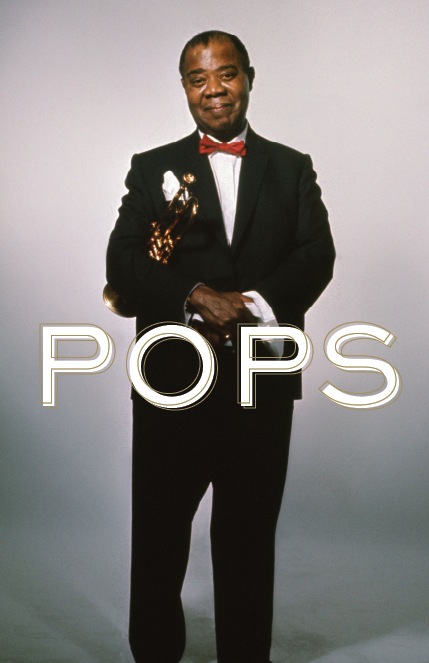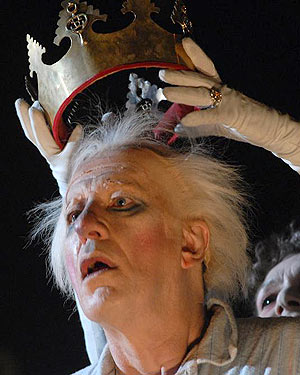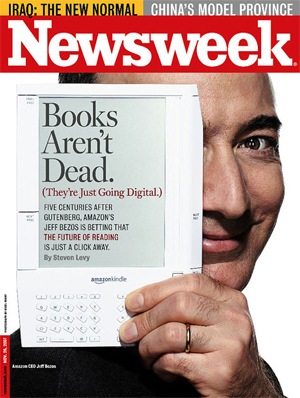“In default of a smell the next best mnemonic is a tune. I have got tunes in my head for every war I have been to, and indeed for every critical or exciting phase in my life. Some day when my ship comes home, I am going to have them all collected in gramophone records, and then I will sit in a chair and smoke my cigar, while pictures and faces, moods and sensations long vanished return; and pale but true there gleams the light of other days.”
Winston Churchill, My Early Life (courtesy of Michael Greenspan)
Archives for March 2009
TT: Man and legend
Pops: A Life of Louis Armstrong, which will be published by Houghton Mifflin Harcourt on December 2, is now listed on amazon.com.
 This is what the dust jacket will look like. The picture is by Philippe Halsman. It was taken in 1966 at a photo shoot that also produced the better-known image that accompanied Life‘s cover story on Armstrong.
This is what the dust jacket will look like. The picture is by Philippe Halsman. It was taken in 1966 at a photo shoot that also produced the better-known image that accompanied Life‘s cover story on Armstrong.
In case you’re wondering, I couldn’t be happier with the design for Pops. Not only does it have tremendous visual impact, but Halsman’s photo is one of the few pictures of Armstrong taken by a professional photographer that captures something of the interior complexity to which I allude in the prologue:
The legend of Louis Armstrong is not the whole story, just as there was more to him than the grinning jester with the gleaming white handkerchief who sang “Hello, Dolly!” and “What a Wonderful World” night after night for adoring audiences. “To friend and foe alike,” the trumpeter Humphrey Lyttelton wrote, “there was, deep below the surface of companionship and bonhomie, an impenetrable wall in which every stone was an enigma.” His disposition was not always cloudless, either, though he preferred not to share his occasional sorrows with strangers. Armstrong taped dozens of his private conversations during the last quarter-century of his life, and these tapes, which until recently were inaccessible to scholars, show that his personality was tougher and more sharp-edged than his fans knew. Off stage he could be moody and profane, and he knew how to hold a grudge. “I got a simple rule about everybody,” he told a journalist. “If you don’t treat me right–shame on you!”
I’ve done my very best to penetrate Armstrong’s inviting yet enigmatic surface in Pops. I hope you find the results illuminating.
TT: Noise in the system
It’s crunch time on Broadway–new shows are now opening back to back–and crunch time for me as well, what with The Letter and Pops: A Life of Louis Armstrong making their way down the pipeline. The result of all this nonstop activity is that I’m in a more or less constant frenzy, against which my body rebelled last week. Like many respectable gentlemen of a certain age, I get kidney stones on occasion, and one of them took an untimely bow midway through the preview of Eugène Ionesco’s Exit the King that I reviewed in last Friday’s Wall Street Journal. Much to my surprise, I managed to pay attention to what I was seeing and write about it before going to bed, but I was knocked out for the next couple of days and had to cancel a trip to Washington as a result.
As always I jumped back on the horse–I saw Irena’s Vow, Happiness, Hair, and Reasons to Be Pretty this weekend–but for the moment I don’t have a whole lot of time or energy to spare, so forgive me if I post a bit irregularly this week. I shall return!
TT: Almanac
“As a priest, I’ve learned that people only cry over what they’ve lost, or missed getting, and I’m surely no exception to that.”
Jon Hassler, A Green Journey
TT: Beating up the bourgeoisie
The Broadway season is now in high gear, and so am I. In today’s Wall Street Journal drama column I cover three openings, God of Carnage, Exit the King, and Impressionism. Here’s an excerpt.
* * *
Yasmina Reza is back on Broadway with another of her slightly pretentious, consummately effective comedies of middle-class manners, and Jeff Daniels, Hope Davis, James Gandolfini (that’s Tony Soprano to you) and Marcia Gay Harden are playing it for all it’s worth. In “God of Carnage” we spend 90 action-packed minutes eavesdropping on two married couples whose children got into a schoolyard scrap that turned bloody. The couples have met in order to work things out in a civilized manner, but by play’s end things have gotten way, way, way out of hand, everyone is more than half in the bag and the audience has laughed itself well past silly….
While “God of Carnage” is much funnier than “Life x 3,” Ms. Reza’s last Broadway outing, it bears a similar family resemblance to “Who’s Afraid of Virginia Woolf?” The difference is that “God of Carnage” is much shorter and far less serious than “Virginia Woolf.” It is, in truth, a knockabout farce whose “moral” is a spoonful of medicine to help the sugar go down, and Matthew Warchus (“Boeing-Boeing”) has staged it with bristling vigor and hair-trigger timing. Everyone in the cast is terrific, especially Ms. Davis…
 Unlike “God of Carnage,” which pretends to be deeper than it is, Eugène Ionesco’s “Exit the King” is the real thing, a full-fledged absurdist satire whose unlikely presence on Broadway can only be explained by the fact that Susan Sarandon is in the cast. The premise is thoroughly Ionescoan: King Berenger the First (Geoffrey Rush), a tyrant who is 400 years old and failing fast, is informed by his first wife (Ms. Sarandon) that he will die “in an hour and a half…at the end of the show.” He declines to go quietly. Horrific hijinks ensue, followed by the king’s scheduled demise. Blackout–and I do mean black.
Unlike “God of Carnage,” which pretends to be deeper than it is, Eugène Ionesco’s “Exit the King” is the real thing, a full-fledged absurdist satire whose unlikely presence on Broadway can only be explained by the fact that Susan Sarandon is in the cast. The premise is thoroughly Ionescoan: King Berenger the First (Geoffrey Rush), a tyrant who is 400 years old and failing fast, is informed by his first wife (Ms. Sarandon) that he will die “in an hour and a half…at the end of the show.” He declines to go quietly. Horrific hijinks ensue, followed by the king’s scheduled demise. Blackout–and I do mean black.
Ionesco called “Exit the King” “an attempt at an apprenticeship in dying,” a description which, though perfectly accurate as far as it goes, fails to convey the macabre gusto of this now-ludicrous, now-terrifying parable of dissolution and resignation. Mr. Rush, however, gets the point right in the heart: The decayed flamboyance of his performance as the dying king is the stuff Tonys are made of….
Next to nothing need be said about Michael Jacobs’ “Impressionism,” an off-the-rack weeper-with-jokes about an August-October romance between a lonely art dealer (Joan Allen) and a washed-up photographer (Jeremy Irons). Mr. Jacobs writes TV scripts, and “Impressionism” plays like one–the scene changes are too frequent and too slow–but the chemistry between Ms. Allen and Mr. Irons is strong enough to obscure the fact that their lines are as predictable as the décor in a chain motel….
* * *
Read the whole thing here.
TT: Almanac
“I do not wish to be any more busy with my hands than is necessary.”
Henry David Thoreau, Walden
BOOK
Richard Stark, The Mourner/The Score/The Jugger (University of Chicago, $14 each). The University of Chicago Press has just published the second batch of titles in its ongoing uniform edition of the early Parker novels of Richard Stark (that’s Donald Westlake to you). Regular readers of this blog know all about Parker, the toughest career criminal ever to inhabit the pages of a paperback, so suffice it to say that if you have yet to make his acquaintance, now’s the time. When it comes to crime fiction, these hard, laconic novels are as good as it gets (TT).
TT: Told you so
I wrote this “Sightings” column for The Wall Street Journal three years ago. Many of my friends snorted at the time. Now that the rest of the world has caught up with me, perhaps it’s worth revisiting what I had to say in 2006.
* * *
The e-book is back. So are the technophobes who swear it’ll never catch on. They were right last time, and they might be right this time, too. Sooner or later, though, they’ll be wrong–and when they are, your life will change.
 The word “e-book” is short for “electronic book.” The concept isn’t new–the complete texts of countless classics have long been available on the Web in digitized form. (Seventeen thousand of them can be downloaded for free at www.gutenberg.org.) The catch is that until now, there hasn’t been a user-friendly way to read e-books. Few people enjoy reading book-length documents on a conventional computer screen, and though hand-held e-book readers went on the market six years ago, they were insufficiently convenient to use and failed to interest the book-buying public.
The word “e-book” is short for “electronic book.” The concept isn’t new–the complete texts of countless classics have long been available on the Web in digitized form. (Seventeen thousand of them can be downloaded for free at www.gutenberg.org.) The catch is that until now, there hasn’t been a user-friendly way to read e-books. Few people enjoy reading book-length documents on a conventional computer screen, and though hand-held e-book readers went on the market six years ago, they were insufficiently convenient to use and failed to interest the book-buying public.
Now Sony has announced plans to market a paperback-sized e-book reader that makes use of E Ink, a new display technology whose makers say it duplicates “the experience of reading from paper.” The Sony Reader, which fits comfortably in one hand, will hold hundreds of e-books in its memory, and its internal battery allows for 7,500 page turns per charge.
It remains to be seen whether the Sony Reader and E Ink are capable of delivering on their fine-sounding technological promises. But Sony has made another promise that is at least as significant: It will also open an iMusic-style online store from which purchasers can download e-books as easily as they download music onto their iPods. Three major publishers, HarperCollins, Random House and Simon & Schuster have agreed to sell their books through Sony, and HarperCollins and Simon & Schuster plan to make their entire backlists available for downloading as soon as they negotiate royalty rights with the authors.
If the Sony Reader (which goes on sale this spring) takes off where previous ventures fell flat, it will be because Sony is offering what marketers call an “end-to-end” solution to the problem of the e-book. That kind of one-stop shopping is what made Apple’s iPod so successful: You don’t just buy the iPod itself, but an easy-to-use system that allows you to download any one of tens of thousands of popular songs within minutes of taking your iPod out of the box.
So will it fly? I don’t know. Still, I’m certain that something like the Sony Reader will catch on, if not this year then in a short time. The phenomenal success of the iPod strongly suggests that many, perhaps most consumers are ready to start buying digital books on the Web and storing and reading them electronically.
And what happens after that? It goes without saying that the economic impact of the e-book on publishers and booksellers will be dramatic (I wouldn’t want to own a brick-and-mortar bookstore these days). But I’m more interested in how the e-book will affect the way we read–and write. New technologies, after all, change art, often in profound and unpredictable ways. I doubt the inventor of the electric guitar foresaw Jimi Hendrix, any more than Thomas Edison foresaw chick flicks. The only thing of which you can be certain is that the existence of the e-book will cause the authors of the 21st century to go about their business very differently than did their 20th-century predecessors.
Many of these differences will arise from the way in which the e-book encourages self-publishing. Best-selling novelists, for instance, will soon be in a position to “publish” their own books, pocketing all the profits–but so will niche-market authors whose books don’t sell in large enough quantities to interest major publishers.
Might the e-book make the writing of serious literary fiction more economically viable? Consider the experience of Maria Schneider, the jazz composer whose CDs are sold exclusively on her Web site, www.mariaschneider.com. Ms. Schneider uses ArtistShare, a new Web-based technology that makes it easier for musicians to sell self-produced recordings online. Not only did she win a Grammy for her first ArtistShare release, “Concert in the Garden,” but she kept all the proceeds as well. Several other well-known jazz musicians, including the guitarist Jim Hall and the trombonist Bob Brookmeyer, have since signed up with ArtistShare, which frees them from the need to compromise with money-conscious record-company executives. Will e-books have a similarly liberating effect on authors? I wouldn’t be surprised.
Yes, I miss the bookstores of my youth, and I’m sure I’ll miss the handsomely bound volumes that fill the shelves in my apartment as well (though I won’t miss dusting them, or toting them around by the half-dozen whenever I go on vacation). The printed book is a beautiful object, “elegant” in both the aesthetic and mathematical senses of the word, and its invention was a pivotal moment in the history of Western culture. But it is also a technology–a means, not an end. Like all technologies, it has a finite lifespan, and its time is almost up.
